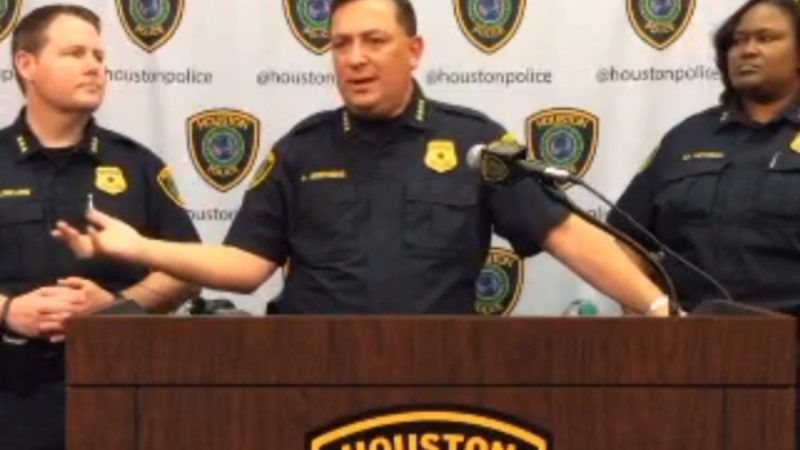Houston's Police Chief Insists That Cops Who Executed a Deadly Drug Raid Based on Lies 'Had Probable Cause to Be There'
Although the warrant was based on a heroin purchase that never happened, Art Acevedo says, there was other, unmentioned evidence that would have justified a search.

Houston Police Chief Art Acevedo insists that the narcotics officers who shot and killed a middle-aged couple on January 28 after breaking into their home "had probable cause to be there," even though they were executing a search warrant that was based on a fraudulent affidavit. Acevedo's position is pretty puzzling, since the sole basis for the no-knock search warrant, which led to a deadly raid that found no evidence of drug dealing, was a "controlled buy" of heroin that he says never happened.
Gerald Goines, the veteran narcotics officer who wrote the affidavit seeking a no-knock search warrant for the house at 7815 Harding Street, was recently charged with two counts of felony murder based on the allegation that his lies led to the deaths of the home's owners, Dennis Tuttle and Rhogena Nicholas. Goines claimed in the affidavit that a confidential informant had bought black-tar heroin at the Harding Street house the day before the raid. After the operation went horribly wrong, setting off a gun battle that injured Goines and three other officers as well as killing Tuttle and Nicholas, he admitted that no such transaction had occurred. Steven Bryant, a narcotics officer who backed up Goines' story, faces a felony charge of tampering with a government document.
"We didn't need to lie," Acevedo said on August 23, the day that Harris County District Attorney Kim Ogg announced the charges against Goines and Bryant. "We could have done this right….When somebody lies to obtain a search warrant, that's a problem." When KPRC, the NBC station in Houston, asked him about his claim, a few weeks after the raid, that "we still had a reason to be at that home," Acevedo replied, "I stand by that. We had probable cause to be there."
It is hard to see how that can be true. According to Acevedo, Goines' investigation of alleged drug dealing at the Harding Street house was triggered by a tip from a patrol officer who had responded to a January 8 call in which an unnamed woman reported that her daughter "was in there doing heroin." At a press conference three days after the raid, Acevedo described the call this way: "The caller wanted to remain anonymous but said that her daughter was inside the residence 'doing drugs, and they have a lot of guns in the residence.' She stated there was also a female in the house." The woman said she had looked through a window, and she saw that "her daughter was in the house, and there were guns and heroin."
When two patrol officers arrived in response to that call, the woman was nowhere to be found. According to Acevedo, they questioned a passer-by and afterward heard her say into her cellphone, "Hey, the police are at the dope house." When the officers called the woman who had made the report, Acevedo said, "She stated she did not want to give any information because they were drug dealers and they would kill her. She wanted the officers to go into the house and get her daughter." The officers explained that they had no authority to enter the house.
The tip about that incident seems to have been the only basis for suspecting that Tuttle and Nicholas were selling heroin. In his affidavit, Goines, who supposedly had been investigating them for two weeks, cited no suspicious activity consistent with drug dealing. (Nor was any noticed by neighbors who spoke to reporters after the raid, notwithstanding Acevedo's claim that the home was known locally as a "drug house" and "problem location.") Goines apparently had not even bothered to look up the names of the home's owners; he described the middle-aged man who supposedly had sold heroin to the nonexistent confidential informant as a "white male, whose name is unknown."
If Goines had developed evidence to support a search warrant, as Acevedo suggests, why did he feel a need to invent a transaction by a fictitious confidential informant? Why was that fantasy the only evidence cited in the affidavit? Goines' behavior makes no sense if police had an independent basis for probable cause.
"Our government should not have intervened in that home, and two people are dead as a result," Ogg told KPRC. "The probable cause to obtain the search warrant was false."
The initial tip did not provide probable cause for a search. Neither did the phony controlled buy. But according to Acevedo, police could have obtained a warrant based on other, unspecified evidence that Goines for some mysterious reason failed to cite.
That claim is of a piece with the way Acevedo described the officers who killed Tuttle and Nicholas after starting a gunfight by breaking into the house without warning and using a shotgun to kill the couple's dog. "I still think they're heroes," Acevedo said after Goines and Bryant were charged. While those two officers may be bad apples, Acevedo said, their colleagues "acted in good faith" and appropriately used deadly force to defend themselves. The first claim is debatable based on what we know so far, and the second is highly dubious given the raid's recklessness. Acevedo's assertion of probable cause based on evidence that was never presented to a judge is even harder to believe. It does not inspire confidence in his ability to recognize, let alone correct, the supervisory deficiencies that made this fiasco possible.


Show Comments (53)